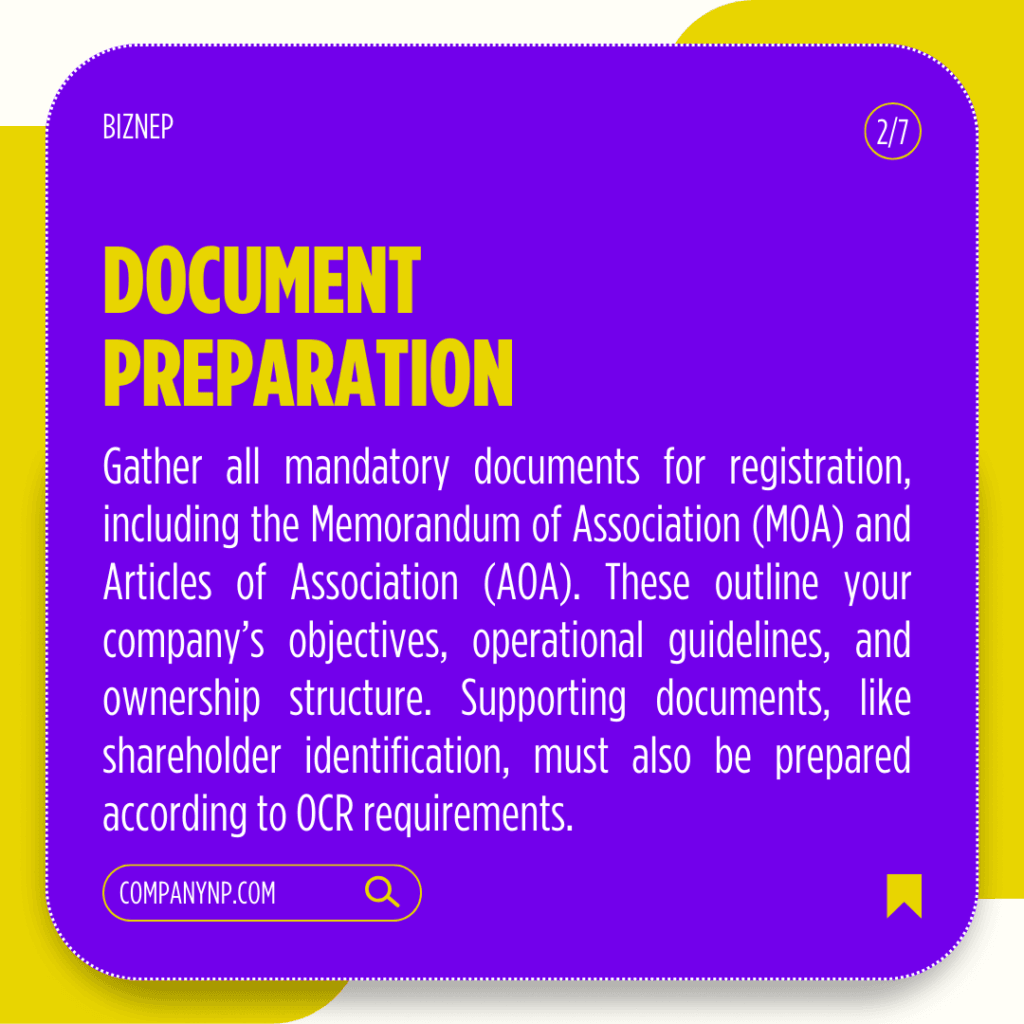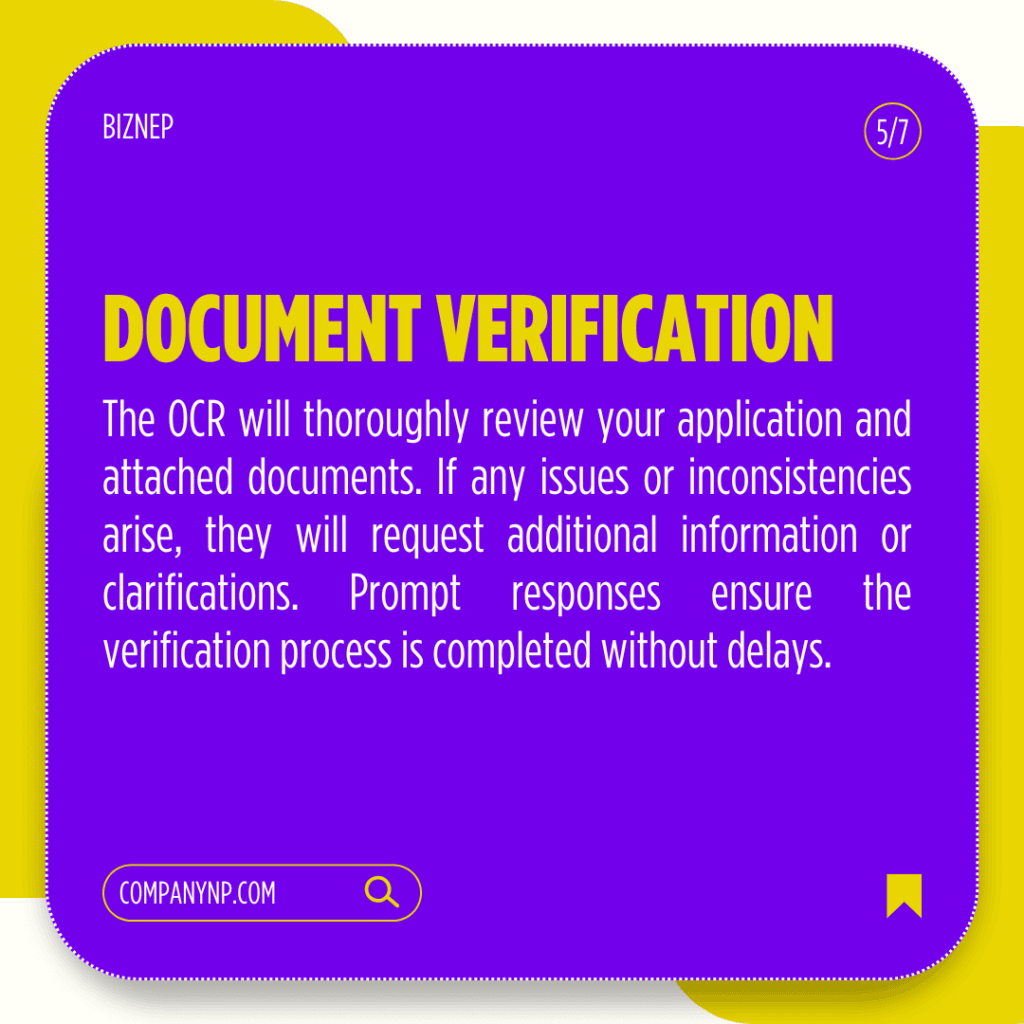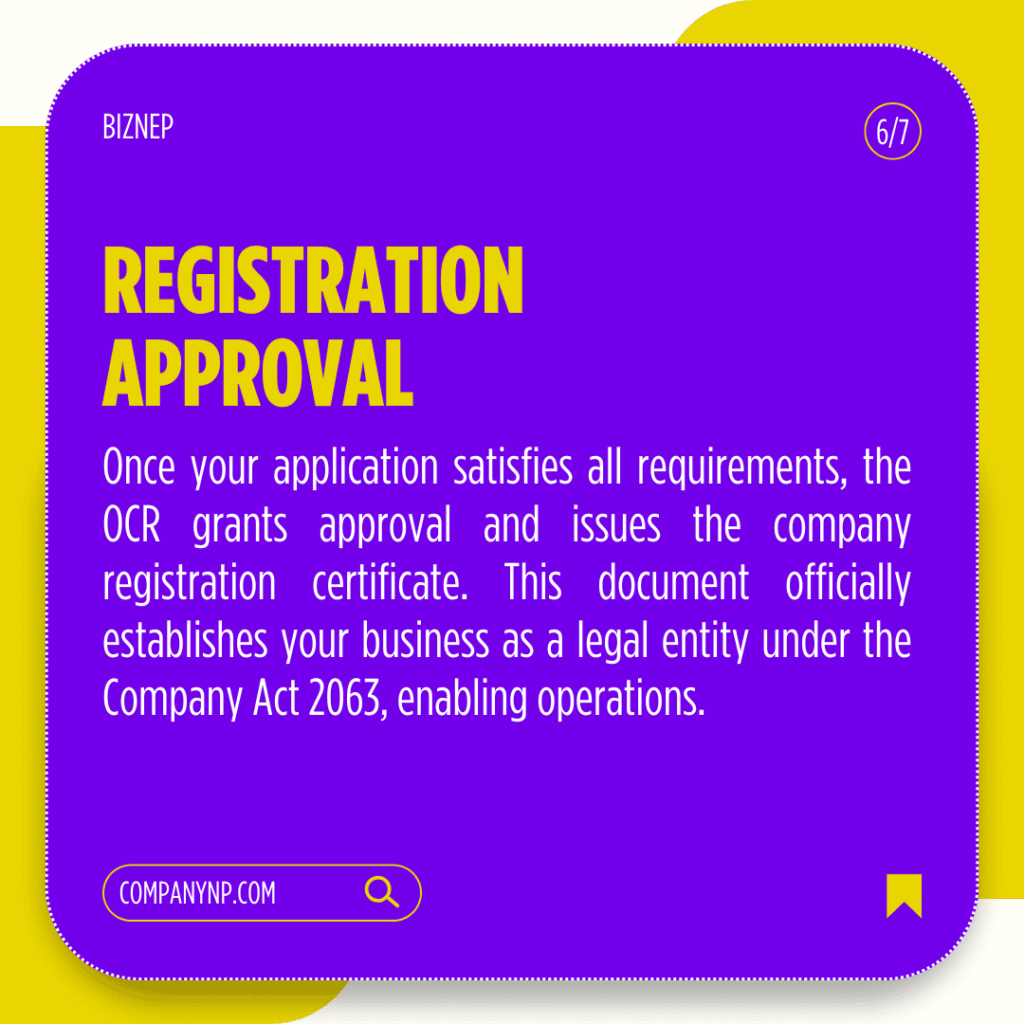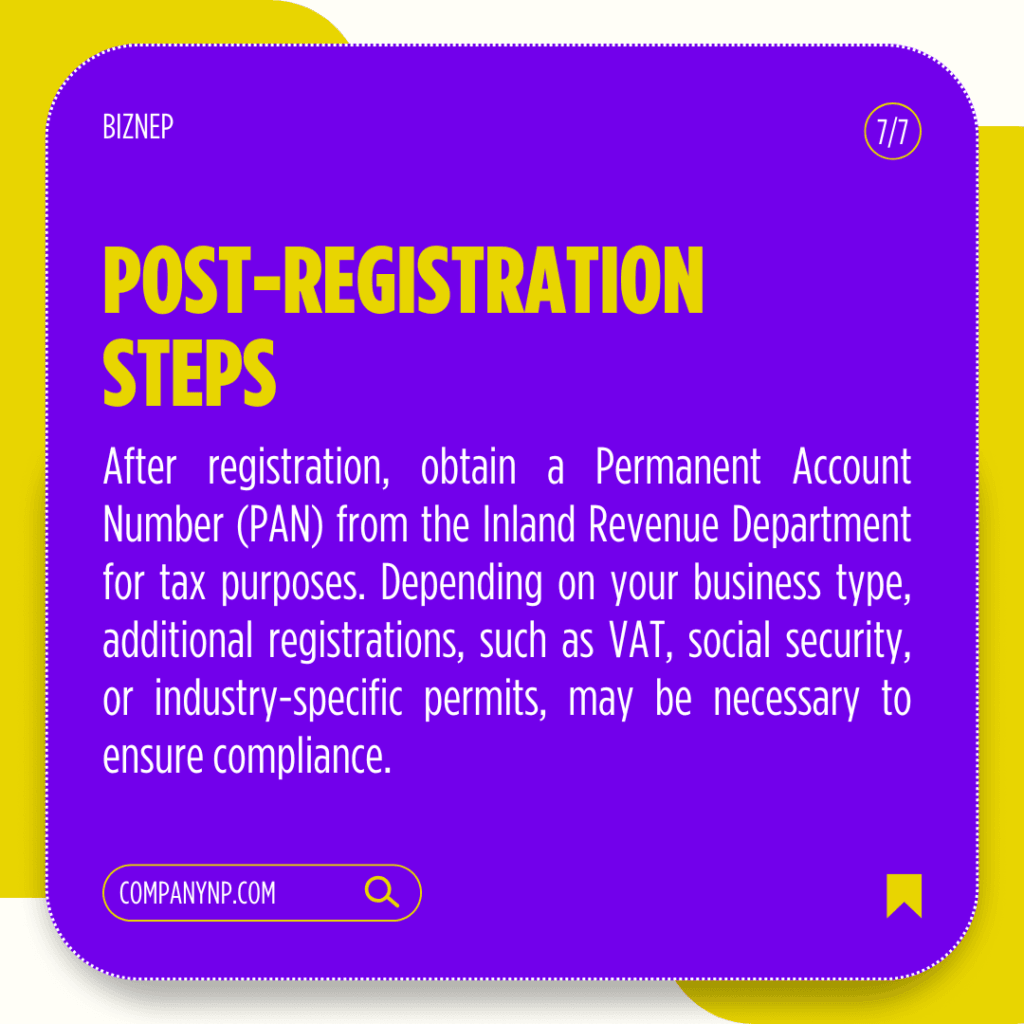Company registration in Nepal is the official process of establishing a legal business entity recognized by the government. It involves registering your business with the Office of the Company Registrar (OCR), which falls under the Ministry of Industry, Commerce, and Supplies.
This guide will walk you through everything you need to know about company registration process in Nepal, from the basics to the post-registration requirements.
How to Register Company in Nepal?
Company Registration Process in Nepal
- Step 1: Submit a unique company name at camis.ocr.gov.np.
- Step 2: Prepare the MOA, AOA, and Application Form
- Step 3: Pay registration fees online or at designated banks.
- Step 4: Wait for the OCR to review your application
- Step 5: Receive a company registration certificate upon approval.
- Step 6: Register with Inland Revenue Department and Local Ward Office.
Step 1: Submit a unique company name at camis.ocr.gov.np
Propose and reserve a distinct company name online through the OCR portal (camis.ocr.gov.np), ensuring it complies with naming guidelines and is available.
Step 2: Prepare the MOA, AOA, and Application Form
Draft and finalize the Memorandum and Articles of Association, along with the completed company registration application form, following the Companies Act requirement.
Step 3: Pay registration fees online or at designated banks
Submit applicable company registration fees via OCR’s online payment system or physically at authorized banks, based on company’s authorized capital
Step 4: Wait for the OCR to review your application
Office of the Company Registrar (OCR) verifies submitted documents and application details for accuracy and compliance with legal standards before granting approval.
Step 5: Receive a company registration certificate upon approval
Upon successful review, OCR issues the Certificate of Incorporation, confirming legal establishment of the company under Nepalese law.
Step 6: Register with Inland Revenue Department and Local Ward Office
Obtain PAN/VAT from Inland Revenue Department and notify local Ward Office for operational and tax compliance as per regulatory requirement
This process typically takes 1-5 working days by using company registration service through CompanyNP.
Read More:
Company Registration Service in Nepal
NGO Registration in Nepal
Trademark Registration in Nepal
What Documents are Required for Company Registration?
The Required Documents for Company Registration as of 2025 are:
- Application Form for Company Registration
- Signed and Thumbprinted AOA and MOA of the Company
- National Identity Card
- Citizenship of Shareholders
- Name of Company
- Location of Company
- Capital of the Company
For foreign investors, additional documents may be required:
- Copy of passport
- Visa documents
- Approval from the Department of Industry (for foreign investment)
We also recommend consulting with the best corporate law firm in Nepal to obtain expert assistance with corporate legal matters.
How Long Does Company Registration Take in Nepal?
The duration of the company registration process in Nepal can vary depending on several factors. On average, it takes about 3-7 working days to complete the registration once all the required documents are submitted correctly.
What are the Costs Associated with Company Registration?
Understanding the costs involved in company registration is crucial for budgeting your business startup. The fees for registering a company in Nepal vary based on the type and size of the company. Here’s a breakdown of the main costs:
Registration Fees:
- Private Limited Company: NPR 9,500 to NPR 45,000 (based on authorized capital)
- Public Limited Company: NPR 50,000 to NPR 100,000 (based on authorized capital)
Additional Costs:
- Name reservation fee:
- Articles and Memorandum of Association preparation: Varies (if using a lawyer or consultant)
- Notary fees: Approximately NPR 500-1000
- PAN registration
- Company stamp: NPR 300-500
It’s important to note that these fees are subject to change, and there may be additional costs depending on your specific business needs, such as legal consultation fees or fees for obtaining specific licenses.
Where to Register a Company in Nepal?
In Nepal, the primary authority responsible for company registration is the Office of the Company Registrar (OCR). The OCR is located in Kathmandu, the capital city of Nepal. However, to make the company registration process in nepal more accessible, the government has established branch offices in other major cities across the country.
What Laws Govern Company Registration in Nepal?
The primary laws governing company registration and operation in the country are:
- Companies Act, 2063 (2006)
- Industrial Enterprises Act, 2076 (2020)
- Foreign Investment and Technology Transfer Act, 2075 (2019)
- Income Tax Act, 2058 (2002)
- Labor Act, 2074 (2017)
The Companies Act, 2063 is the cornerstone legislation that outlines the procedures for company formation, registration, operation, and dissolution. It defines different types of companies and their legal requirements.
What to do after the Registration of Company?
The Things to Do After Company Registration Process in Nepal are:
- Obtain a Permanent Account Number (PAN) from the Inland Revenue Department
- Register for Value Added Tax (VAT) if your annual turnover exceeds NPR 5 million
- Open a corporate bank account
- Register with the Social Security Fund for employee benefits
- Obtain necessary industry-specific licenses or permits
- File annual returns and audited financial statements with the OCR
- Hold annual general meetings (for public limited companies)
Compliance Requirements
- Regular tax filings (income tax, VAT, etc.)
- Maintaining proper books of accounts
- Updating the OCR about any changes in company structure or details
- Renewing business licenses and permits as required
Staying compliant with these post-registration requirements is crucial for maintaining your company’s good standing and avoiding penalties or legal issues.
What are the Main Types of Companies in Nepal?
The Major Types of Businesses that can be incorporated in Nepal are as follows:
- Private Limited Company
- Public Limited Company
- Non-Profit Company
- Foreign Company (Branch Office)
- Single-Person Company
| Company Type | Key Features |
|---|---|
| Private Limited Company | – Most common type for small to medium businesses – Minimum 1 and maximum 101 shareholders – Limited liability protection for shareholders – Easier to manage and less regulatory compliance compared to public companies |
| Public Limited Company | – Suitable for large businesses – Minimum 7 shareholders, no maximum limit – Can raise capital from the public through share issuance – Subject to stricter regulatory requirements |
| Non-Profit Company | – Established for charitable, social, or educational purposes – Profits must be used for the company’s objectives, not distributed to members |
| Foreign Company (Branch Office) | – Established by foreign companies to conduct nepal company registration – Requires approval from the Department of Industry |
| Single-Person Company | – A relatively new concept in Nepal – Allows a single individual to incorporate a company – Limited liability protection for the owner |
Choose the type that best aligns with your business goals, scale of operations, and funding requirements.
How to Register a Company in Nepal?
Visit camis.ocr.gov.np for online company registration in Nepal.
Choose Company Type: Decide between private, public, or non-profit.
Submit Required Documents: Company name approval, Articles of Association (AOA), Memorandum of Association (MOA), and shareholder details.
Pay Fees: Fees vary based on authorized capital (Company Act 2063).
Obtain PAN/VAT: Register for tax at the Inland Revenue Office.
What is a Private Company in Nepal?
Definition: A company with limited liability owned by private individuals under the Company Act 2063.
Ownership: Limited to 1-50 shareholders.
Features: Cannot publicly trade shares, and transfer of shares is restricted.
Examples: Small businesses, family enterprises.
How can I check Company Name in Nepal?
Step 1: Visit camis.ocr.gov.np.
Step 2: Use the “Name Reservation” feature to search for name availability.
Step 3: Ensure the name aligns with Company Act 2063 regulations (unique and non-offensive).
Step 4: Reserve the name if available.
How to Register a Non-Profit Company in Nepal?
Step 1: Prepare documents (MOA, AOA, objectives).
Step 2: Apply through camis.ocr.gov.np.
Step 3: Register under Section 166 of the Company Act 2063.
Step 4: Provide details of at least seven members.
Step 5: Obtain approval from the Office of the Company Registrar.
How to Start a Small Business in Nepal?
Step 1: Conduct market research.
Step 2: Choose a business type (sole proprietorship, private limited, etc.).
Step 3: Register the business at camis.ocr.gov.np.
Step 4: Obtain PAN/VAT from the tax office.
Step 5: Secure necessary licenses (e.g., FDI approval for foreign investors).
How Many Types of Companies Are There in Nepal?
According to the Company Act 2063, there are four main types:
Private Company: Owned privately, up to 50 shareholders.
Public Company: Shares publicly traded, minimum seven shareholders.
Non-Profit Company: Registered under Section 166 for charitable purposes.
Partnership/Joint Ventures: Operate under distinct legal frameworks.
What to do after Company Registration in Nepal?
Step 1: Conduct PAN Registration at IRD
Step 2: Register Business at Local Ward Office
Step 3: Open Bank Account & Deposit Capital
Step 4: Obtain Share Registry from OCR
Step 5: Provide 3-Month Compliance Notice to OCR
Which Business is Most Profitable in Nepal?
Tourism: Treks, tours, and hospitality services.
Agriculture: Organic farming and agro-based industries.
E-commerce: Growing demand for online goods.
Hydropower: Export potential for energy.
Education: Private schools, training institutes.









